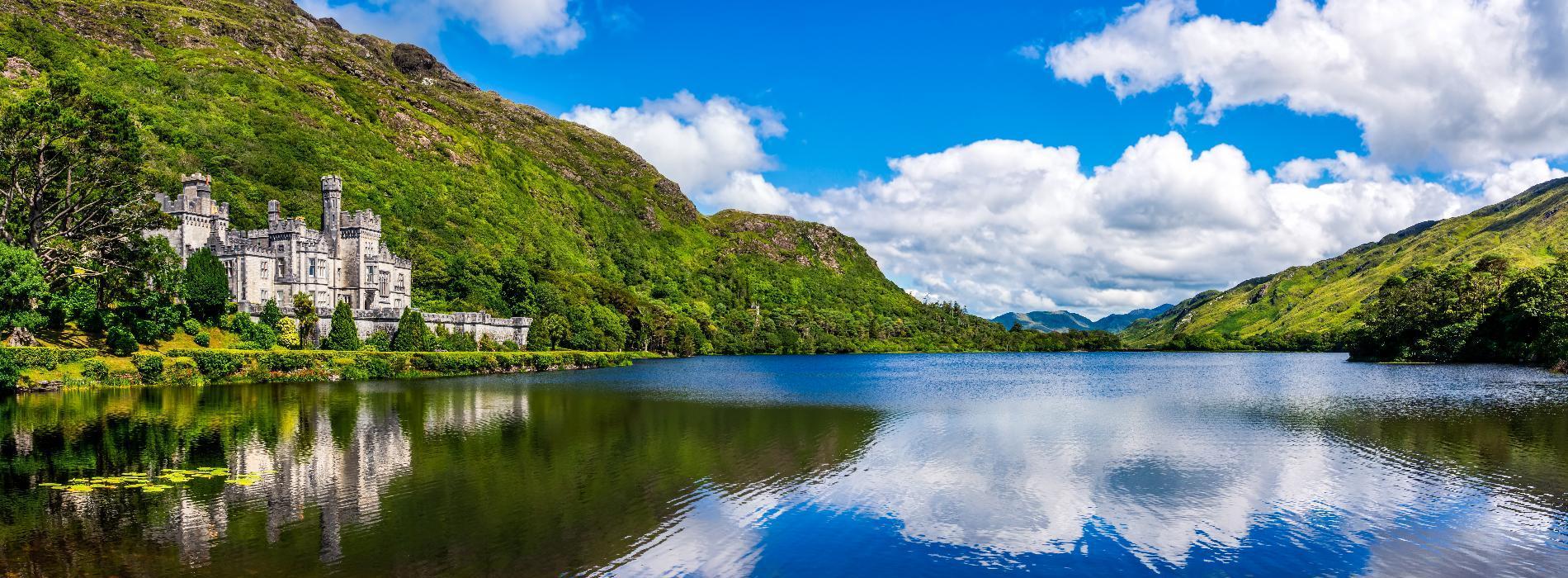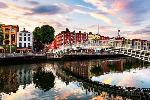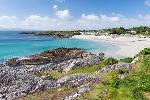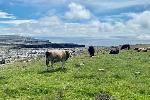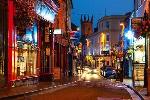Relocating to Ireland
An Overview of Ireland
Ireland, also known as ‘The Emerald Isle’ or ‘Éire’ is the third largest island in Europe and is situated in the North Atlantic Ocean in north-western Europe. Geopolitically, Ireland is divided between the Republic of Ireland (83% of the island and 26 of the 32 counties) and Northern Ireland which is part of the United Kingdom (17% of the island and 6 of the 32 counties).
Traditionally, Ireland is subdivided into 4 provinces: Connacht (west), Leinster (east), Munster (south) and Ulster (north). According to the Central Statistics Office’s latest survey collected in April 2022, the Republic of Ireland has a population of just over 5.1 million, up 7.6% since the last survey was undertaken in 2016.
From the stunning Cliffs of Moher to the pristine Killarney National Park, Ireland has such natural beauty to offer, and between that and the natural Irish charm, it makes people instantly feel welcome and at home here. Although Ireland is a small island when compared to other countries in Europe, it is full of history and beautiful places to visit, no matter what county you chose to live in or visit.
Places to Visit in Ireland
Cobh City, just 15 minutes from Cork City is particularly popular amongst cruise-lovers and served as the final port of call for the well known RMS Titanic in 1912. Cobh redefines charming with its rows of candy-coloured homes along the water and the towering cathedral standing sentry over the harbour.
Glendalough in County Wicklow, just a 50 minute drive from Dublin City, is a 7th century monastery that’s a popular Catholic pilgrimage destination. Located in a glacial valley consisting of two lakes (the upper and lower lakes), this is an archaeologically and architecturally rich landscape with a matching wealth in history.
The Cliffs of Moher in County Clare are 400-foot-high cliffs stretching 5 miles along the Atlantic coast. They are better known internationally as the ‘Cliffs of Insanity’ from the 1987 film 'The Princess Bride'. As weather can be somewhat unpredictable in the west of Ireland, visiting the Cliffs is preferably advised during the summer season.
Skellig Michael is well worth the boat ride out from the coast of Kerry. This craggy, emerald-green island is home to the remains of a 6th century monastery which you can explore after a steep 600-step climb! While in Kerry, why not also visit the stunning 41 square mile Killarney National Park.
The Rock of Cashel in County Tipperary, is one of Ireland’s most popular tourist attractions and is also one of the most beautiful – a group of medieval buildings dating back to the 12th century.
Galway City – a prime location on Ireland’s west coast and close to the Aran Islands and the Connemara region. While on that side of Ireland, taking a trip to Kylemore Abbey in Galway is also a must.
Fanad Head Lighthouse in County Donegal is also a beautiful stop-off on the Wild Atlantic Way for photography enthusiasts. The lighthouse was voted one of the most beautiful in the world standing at 120 feet above sea level.
If you would like a change from all the green in Ireland, head to the vibrant town of Kinsale in Cork. Kinsale is a historic fishing town and is known for its winding roads lined with pubs and galleries, tucked behind bright purple, cerulean and hot pink buildings. It’s a quant town and well worth seeing.
Achill Island in Mayo is also a stunning location for viewing some of the most dramatic landscape along the Wild Atlantic Way. With sheep lined roads, cliff tops, white sand beaches, peat bogs and a 26-mile bike trail around the whole island of Achill, it certainly takes a place on the Irish bucket list.
Other places of interest include Bunratty Castle in Clare. Coral Beach in Galway, Inisowen in Donegal, Benbulben Mountain in Sligo, the Dingle Peninsula in Kerry, Kilkenny City and much more.
Living in Ireland
According to the ‘Better Life Index’ commissioned by the Organisation for Economic Cooperation and Development (OECD), which compares well-being across 41 member countries, Ireland outperforms the OECD average in jobs, education, health, social connections, safety and life satisfaction.
So, what’s the secret to a good quality of life? Quite often it’s lots of little things, like having access to good public services, a clean and safe environment and having the time to enjoy life.
People are pretty happy in Ireland, they tend to be friendly, welcoming and have a great sense of humour, so it’s no surprise that Ireland well exceeds the average for overall life satisfaction, but how do we fare when it comes to work/life balance?
Work/Life Balance
Spending time with friends and family, or just having some time alone is central to our well-being and is ingrained in our culture. Whether we are able to do enough of this largely depends on the amount of time spent at work. Fortunately, just 4.7% of people in Ireland work very long hours (over 50 hours per week), much lower than the OECD average of 13%. As well as this, 83% of people in Ireland are satisfied with the amount of leisure time they have.
Health
The health system in Ireland is one of the best in the world and is delivered through two tiers – the Irish Public Health System and the Irish Private Health System. The Irish Public Health System is governed by the Health Service Executive (HSE) and provides health and social services to EU/EEA, Swiss nationals and residents of the Republic of Ireland. You do not need to be paying Irish tax or social insurance to avail of publicly funded health services, you must however satisfy the HSE that you are an ‘ordinary resident in Ireland’.
To avail of the Irish Private Health System, you must take out a private health insurance policy. All private health insurance providers in Ireland are registered with the Health Insurance Authority (HIA). As a private health care patient, you can look forward to faster access to diagnosis investigations and subsequent treatments through your choice of consultant. You also have access to both public and private hospitals, depending on the level of your health insurance plan. The cost of your treatment is paid either in full or in part by your insurer. You may also be entitled to refunds on everyday medical costs such as GP charges.
According to the OECD, 84% of people in Ireland reported to be in good health, more than the average of 69%. Thanks to Ireland’s public healthcare system, if you do become unwell and require the relevant health services, there is comfort in knowing that you will not have to worry about going into debt over hospital bills. Furthermore, if you have a European Health Insurance Card (EHIC), this can also be used in Ireland.
Safety
Ireland is quite a peaceful and vibrant place to live. Don’t be overly suspicious of people volunteering to help you – we are renowned for our helpfulness and also for showing off our knowledge! In August 2022, Dublin was reported the safest capital city in Europe. We get along with all our neighbouring countries, our rates of violent crime are much lower than the OECD average and due to our geographical location, there are almost no threats of natural disasters in Ireland apart from the occasional flooding during spring. We are also a country filled with tight-knit communities – according to the OECD, 96% of people believe that they know someone they could rely on in time of need, compared to an average of 89%. All in all, people feel secure here and feel that Ireland is a particularly safe place to raise a family and create a good quality of life for themselves.
Environment
Though we love to complain about the rain, Ireland enjoys a temperate maritime climate, due to its proximity to the Atlantic Ocean and the presence of the Gulf Stream meaning that it is almost never too hot or too cold. We have some of the best air quality in the EU, our water is clean, our soil is productive and abundant, and we value our natural resources. In 2004, Ireland made history by being the first country to ban smoking in workplaces, so you can enjoy smoke-free bars and restaurants. Our NCT (National Car Test), has helped lower car emissions, our BER (Building Energy Rating) encourages energy-efficient housing and our Plastic Bag Levy reduces unnecessary waste. Recycling has increased hugely in the past decade too and we are continuously growing greener. The Department of Environment, Climate and Communications has devised a pathway within their ‘Climate Action Plan 2021’ for Ireland wherein it has committed to achieving a 51% reduction in overall greenhouse gas emissions by 2030, setting us on a path towards reaching net-zero emissions by no later than 2050. By collectively committing to achieving this plan, we will not only cut emissions, create a cleaner, greener economy and society, but we will also help protect ourselves from the devastating consequences of climate change.
Cost of Living
While Ireland may not be the cheapest place to live, inflation has risen steadily for more than a year now within the euro zone, initially fuelled by post-pandemic supply shocks and now by energy prices on the fallout of Russia's war on Ukraine. With that said, 87% of Irish people are satisfied with their standard of living which is much higher than the EU average of 76% (OECD). The biggest expenses in Ireland tend to be rent, mortgage rates, gas, electricity and childcare, but our free healthcare and education, along with some of the highest rates of tax relief in Europe, help make life on the Emerald Isle more affordable.
Visas and permission to enter Ireland
There are some general rules which apply regardless of the reason why you are coming to Ireland.
UK nationals: People who are citizens of the United Kingdom (UK) are entitled to live in Ireland without any conditions or restrictions.
EEA and Switzerland: In general, nationals of EEA countries or Switzerland, have the right to enter Ireland. The EEA is the EU plus Norway, Iceland and Lichtenstein. You do not need a visa but you will need a valid passport or identity card in order to land. You are generally entitled to live in Ireland if you are employed or self-employed. You are entitled to come here to study or retire here if you meet certain conditions.
Your family can come to Ireland too, but they may need a visa to enter Ireland if they are not EEA or Swiss citizens themselves.
Other countries: Citizens of other countries may need to apply for a visa. If you need a visa or not, you need permission to enter Ireland and permission to remain here.
Coming to Ireland to work
UK citizens can live and work in Ireland without restriction. If you have family members who are from outside the UK, EEA or Switzerland, they must apply to join you in Ireland.
EEA and Swiss citizens have the right to live, work or set up a business in Ireland. You are entitled to be treated in the same way as Irish workers. You are entitled to have family members come with you to Ireland.
Younger people from certain countries outside the UK, EEA or Switzerland can apply to come to Ireland on a working holiday.
You may need an employment permit to work in Ireland if you are not in one of the above categories.
Tax and social insurance contributions
If you are working in Ireland, you must make social insurance contributions. This is called Pay Related Social Insurance (PRSI) and is based on your earnings and the type of work you do. If you are an employee, your employer is responsible for PRSI, though you may have to pay an employee’s share. The amount of PRSI paid by you and your employer depends on your social insurance class which is in turn, determined by your earnings and the type of work you do. PRSI is deducted directly from your wages and collected by Revenue. Deductions will always be shown on your pay slip when you are paid.
Obtaining a Personal Public Service Number (PPSN)
A Personal Public Service Number is a unique reference number that helps you access social welfare benefits, public services and information in Ireland.
If you are applying for a PPS Number to take up employment, you must have a signed offer of employment from your employer confirming when your job is due to start or when it started. This letter should be on company headed paper with the employer’s contact details and employer/company registered number. You must also provide evidence of your current passport. Further information regarding the application process is available through www.gov.ie
Equality
Ireland’s equality laws protect individuals from certain kinds of discrimination, harassment and sexual harassment. They aim to promote:
- Equal work opportunities, for example when applying for work, while in a job, going for a promotion or getting equal pay.
- Equal treatment when accessing goods, services, facilities and accommodation, for example when using public services, looking for housing, getting the bus, going to school or college, or going to the pub.
The Employment Equality Acts and Equal Status Acts prohibit discrimination on specific grounds. Generally, discrimination occurs where one person is treated less favourably than another person in a comparable situation, because they differ under any of the following grounds: Age, Civil Status, Disability, Family Status, Gender, Housing Assistance Payment, Membership of the Traveller Community, Race, Religion, Sexual Orientation.
Driving in Ireland
Full driving licences from all other EU member states (and some other countries) are recognised for use in Ireland. You should find out if you need to convert your driving licence to an Irish one. If you want to bring your car to Ireland you need to know about importing a car and implications for Vehicle Registration Tax (VRT).
Public Transport
Public transport is certainly not the only way to travel around the island of Ireland – but it's definitely one of the best! All of Ireland’s public transport is overground, so all you have to do is peer out the windows to take in our cities, towns and villages – along with some of the most stunning landscapes in between. It gives you that time to reflect on your travels, where you have been and where you're going... along with what you want to do when you get there.
Public transport in Ireland consists of buses, coaches, trains, the luas (tram in Dublin and its suburbs only). More rural parts of Ireland are facilitated through a ‘Local Link’ bus service and private taxi companies.
Housing
Some people live in owner-occupied private housing while a number live in private rented accommodation. Social Housing is available but you generally need to have been resident in Ireland for a period of time before you become eligible for it.
Like many popular destinations, housing in Ireland is fairly competitive. Many Irish cities are experiencing a housing shortage, although not as bad as some European ones such as Stockholm. Still, people moving to the Emerald Isle should find a short-term rental first, so that they can give themselves time to sift through the competitive market.
When you find a house or apartment for rent that you like, be prepared to act fast. Because housing availability is limited, you may find that a place you like will not be available a day later. Likewise, there are many different types of houses to choose from, but for a truly great variety, look outside the cities or further away from public transportation.
Renting a House or Apartment
Rented accommodation is available both furnished and unfurnished. Deposits of up to one month's rent are normally required. Accommodation for rent is advertised on the internet. Estate agents in Ireland both sell and let property. It is common in Ireland for people who have not met before, to rent a house together and to share the costs of the house, including gas, telephone and electricity bills. The average cost of renting throughout the whole country at the moment is just over €1,400 per month. This accounts for rents that range from the most expensive (Dublin €2,200 per month) to the most affordable (Leitrim €600 per month). Useful sites include: www.daft.ie www.rent.ie www.myhome.ie www.let.ie and www.property.ie
Buying a Property
There are no requirements or restrictions on purchasing a property in Ireland as an EU/EEA or non-EU/EEA citizen, although not having a PPSN will slow down the process. There are two ways to purchase property in Ireland – Public Auction or Private Sale.
Details of houses for sale are available in newspapers, through estate agents and on the internet. Mortgages can be applied for through banks, building societies or mortgage brokers. Interest rates vary and may be at a fixed or variable rate. When applying for a mortgage, you will be required to provide multiple documents to demonstrate your financial stability and your intent to own property in Ireland. Housing types range from typical city apartments, to detached, semi-detached homes, country side cottages, bungalows and large family estates. When considering a house purchase in Ireland, you should keep in mind the space you will need for you and your family, the location/proximity to schools and public transport and whether you would prefer to be closer to cities, towns or the secluded mountains. Useful sites include: www.daft.ie www.myhome.ie www.gumtree.ie
Pets: There are regulations about importing pets from abroad, so you need find out about the procedures for bringing your pet to Ireland.
Coming to Ireland to Study
If you move to Ireland with your children, they can go to school for free from the Irish government up to the end of secondary school (usually when the child is 17 or 18) once the children are legally resident in Ireland. You may have to pay third level fees. How much you pay depends on your residency permission and how long you have lived in Ireland.
In general, universities and other third-level colleges charge higher fees to students from outside the EEA and Switzerland.
You may need to apply for a student visa before you come to Ireland to study. If you don’t need a visa, you still need permission to enter Ireland. This means you must show that you satisfy the conditions to live in Ireland as a student. Different rules apply for short-term courses.
There is a wide variety of primary and second level schools to choose from. It is important to research well before deciding to accept a place for your child. You can get a list of Irish schools on a county-by-county basis from the Department of Education
To enrol your child/teenager, contact the school of your choice directly. In areas of high population density such as Dublin you will need to enrol early (in some cases as soon as your child is born) to secure a place. In schools with waiting lists priority is often given to students from the local primary schools or students who have a relative already in the school.
Third-level education is made up of a number of sectors. The university sector, the technological sector and the colleges of education are substantially funded by the State (some registration fees apply). In addition, there are a number of independent private colleges. The Higher Education Authority is the statutory agency responsible for the funding of universities, institutes of technology and certain other higher education institutions.
If you are thinking of going to college you can search the Qualifax website for details of courses. Generally, applications for undergraduate courses in Ireland are made through the Central Applications Office (CAO).
Most undergraduate students attending publicly funded third-level courses do not have to pay tuition fees. Under the terms of the Free Fees Initiative, the Department of Education pays the fees to the colleges instead. However, a separate annual charge is payable to colleges for the costs of student services and examinations.
The maximum rate of the student contribution for the academic year 2022 – 2023 is €3,000.
Entry to approved third level courses is extremely competitive and places are allocated on the grades achieved in the Leaving Certificate - the final secondary level school exam.
For more information on the Irish education system visit: http://www.citizensinformation.ie/en/education/
Checklist before arriving to Ireland
- A valid EU/EEA or Swiss passport or valid national ID card
- A copy of the contract or terms and conditions of employment and an understanding of them
- Accommodation in the area to which you will be moving
- A European Health Insurance Card (EHIC), emergency medical expenses cover or private health insurance (optional)
- Sufficient funds to last until you are paid or to return home if necessary
- Appropriate E-forms/ U1/U2/U3
- Appropriate language skills of the country in which you wish to work
- A work permit if it is required
- Copies of all the necessary documents (CV, passport, diploma etc.)
- Certified translations of all your education and qualification documents
- A recognition of your qualification www.qqi.ie
Make sure:
- You know social insurance (welfare) and health insurance rules in Ireland
- You have information about transferring your social welfare (security) entitlements
- You have information about jobseeker’s benefit transfer if you are unemployed
- You know the taxation system in Ireland
If you have any queries in relation to the above call your local Public Employment Services Office.
EU / EEA Member Countries:
- Austria
- Belgium
- Bulgaria
- Croatia
- Cyprus
- Czech Republic
- Denmark
- Estonia
- Finland
- France
- Germany
- Greece
- Hungary
- Ireland
- Italy
- Latvia
- Lithuania
- Luxembourg
- Malta
- Netherlands
- Poland
- Portugal
- Romania
- Slovakia
- Slovenia
- Spain
- Sweden
Non-EU EEA Member Countries:
- Iceland
- Norway
- Liechtenstein
- Switzerland
Upon arrival into Ireland
- Check with the Department of Social Protection for up to date information about Social Security regulations. You may need to apply for PPS number (Personal Public Service Number) e.g. if you are taking up employment in Ireland. Please visit Department of Social Protection for information on how to apply.
- Open a bank account to access your wages
- Register yourself with Revenue to avoid paying emergency tax. Registration is done online here: myAccount (ros.ie)
We hope you found this information helpful and you now feel confident taking the next step and apply for a role within Nua Healthcare Services. However, should you need any further information, please contact our relocation representatives who are waiting to assist you.
Relocation Representative:
Georgina Connolly
Email: GConnolly@nuahealthcare.ie
Mobile: +353 (0)86 410 7157
Out of hours & weekends:
Email: eurecruitment@nuahealthcare.ie
Mobile: +353 (0) 89 460 9776
